英语翻译词类转换
- 格式:ppt
- 大小:447.00 KB
- 文档页数:38
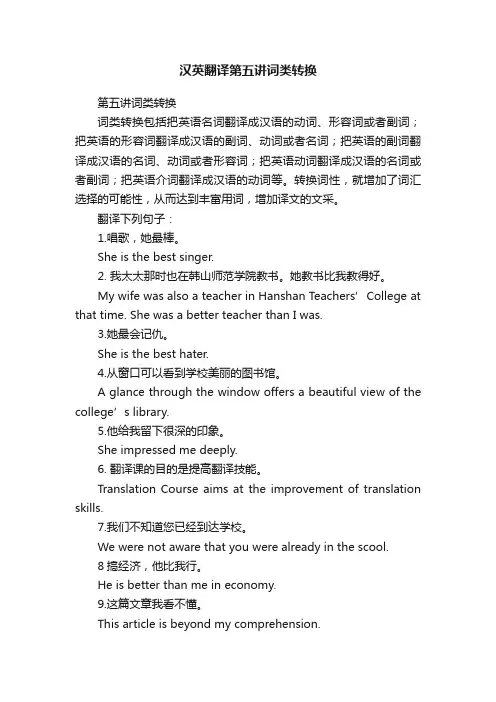
汉英翻译第五讲词类转换第五讲词类转换词类转换包括把英语名词翻译成汉语的动词、形容词或者副词;把英语的形容词翻译成汉语的副词、动词或者名词;把英语的副词翻译成汉语的名词、动词或者形容词;把英语动词翻译成汉语的名词或者副词;把英语介词翻译成汉语的动词等。
转换词性,就增加了词汇选择的可能性,从而达到丰富用词,增加译文的文采。
翻译下列句子:1.唱歌,她最棒。
She is the best singer.2. 我太太那时也在韩山师范学院教书。
她教书比我教得好。
My wife was also a teacher in Hanshan Teachers’College at that time. She was a better teacher than I was.3.她最会记仇。
She is the best hater.4.从窗口可以看到学校美丽的图书馆。
A glance through the window offers a beautiful view of the college’s library.5.他给我留下很深的印象。
She impressed me deeply.6. 翻译课的目的是提高翻译技能。
Translation Course aims at the improvement of translation skills.7.我们不知道您已经到达学校。
We were not aware that you were already in the scool.8搞经济,他比我行。
He is better than me in economy.9.这篇文章我看不懂。
This article is beyond my comprehension.10.穿红衣的女孩来自云南。
The girl in red is from Yunnan.请同学们翻译下列汉语句子。
1.美国试图在经济和政治上孤立古巴。
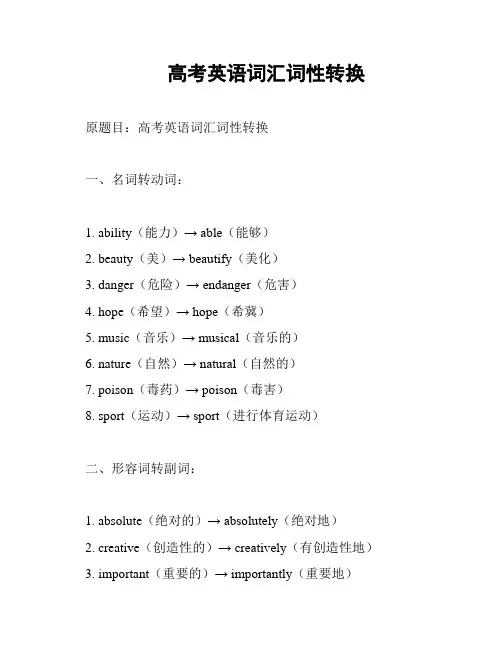
高考英语词汇词性转换原题目:高考英语词汇词性转换一、名词转动词:1. ability(能力)→ able(能够)2. beauty(美)→ beautify(美化)3. danger(危险)→ endanger(危害)4. hope(希望)→ hope(希冀)5. music(音乐)→ musical(音乐的)6. nature(自然)→ natural(自然的)7. poison(毒药)→ poison(毒害)8. sport(运动)→ sport(进行体育运动)二、形容词转副词:1. absolute(绝对的)→ absolutely(绝对地)2. creative(创造性的)→ creatively(有创造性地)3. important(重要的)→ importantly(重要地)4. quick(快速的)→ quickly(快速地)5. simple(简单的)→ simply(简单地)6. slow(缓慢的)→ slowly(缓慢地)三、动词转名词:1. believe(相信)→ belief()2. contribute(贡献)→ c ontribution(贡献)3. help(帮助)→ help(帮助)4. learn(研究)→ learning(研究)5. improve(改善)→ improvement(改善)6. play(玩)→ play(戏剧)7. read(阅读)→ reading(阅读)四、其他词性转换:1. adjust(调整)→ adjustment(调整)2. decide(决定)→ decision(决定)3. possible(可能的)→ possibility(可能性)4. society(社会)→ social(社会的)5. year(年)→ yearly(每年的)以上是一些高考英语常见的词汇词性转换,希望对您有所帮助。
(注:以上内容仅根据常见规则进行转换,可能存在特殊情况不适用,文档内容不保证准确性。
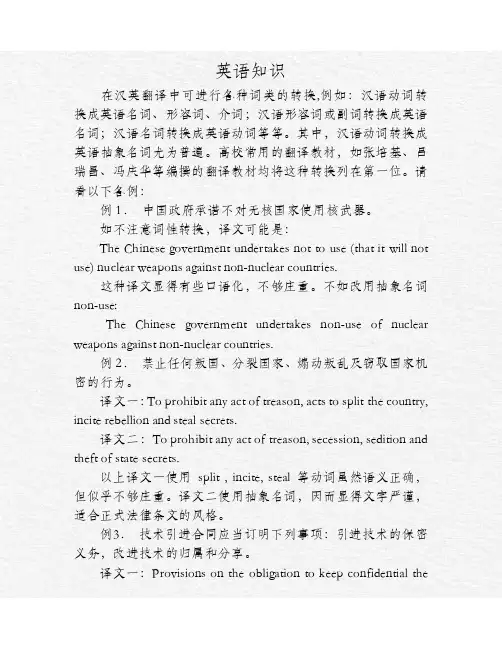
英语知识在汉英翻译中可进行各种词类的转换,例如:汉语动词转换成英语名词、形容词、介词;汉语形容词或副词转换成英语名词;汉语名词转换成英语动词等等。
其中,汉语动词转换成英语抽象名词尤为普遍。
高校常用的翻译教材,如张培基、吕瑞昌、冯庆华等编撰的翻译教材均将这种转换列在第一位。
请看以下各例:例1.中国政府承诺不对无核国家使用核武器。
如不注意词性转换,译文可能是:The Chi nese gov ernmentundertak es not t o use (t hat it w ill notuse) nuc lear wea pons aga inst non-nuclear countri es.这种译文显得有些口语化,不够庄重。
不如改用抽象名词non-use:TheChinesegovernme nt under takes no n-use of nuclear weapons against non-nuc lear cou ntries.例2.禁止任何叛国、分裂国家、煽动叛乱及窃取国家机密的行为。
译文一:To pro hibit an y act of treason, acts t o splitthe coun try, inc ite rebe llion an d stealsecrets.译文二:To prohi bit anyact of t reason,secessio n, sedit ion andtheft of state s ecrets.以上译文一使用split, incit e, steal等动词虽然语义正确,但似乎不够庄重。
译文二使用抽象名词,因而显得文字严谨,适合正式法律条文的风格。
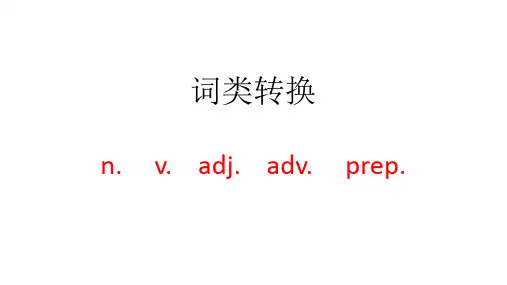
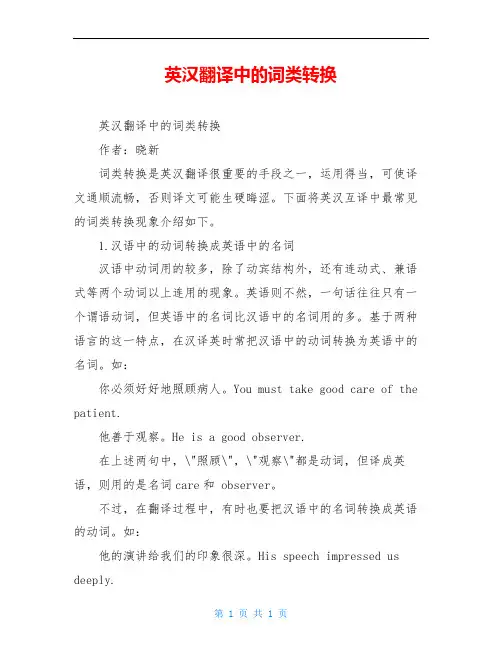
英汉翻译中的词类转换英汉翻译中的词类转换作者:晓新词类转换是英汉翻译很重要的手段之一,运用得当,可使译文通顺流畅,否则译文可能生硬晦涩。
下面将英汉互译中最常见的词类转换现象介绍如下。
1.汉语中的动词转换成英语中的名词汉语中动词用的较多,除了动宾结构外,还有连动式、兼语式等两个动词以上连用的现象。
英语则不然,一句话往往只有一个谓语动词,但英语中的名词比汉语中的名词用的多。
基于两种语言的这一特点,在汉译英时常把汉语中的动词转换为英语中的名词。
如:你必须好好地照顾病人。
You must take good care of the patient.他善于观察。
He is a good observer.在上述两句中,\"照顾\",\"观察\"都是动词,但译成英语,则用的是名词care和 observer。
不过,在翻译过程中,有时也要把汉语中的名词转换成英语的动词。
如:他的演讲给我们的印象很深。
His speech impressed us deeply.2.汉语中的动词转换为英语的形容词汉语中一些表示知觉、情感的动词,往往可以转译成英语形容词,通常用\"be +形容词......\"的.结构来表达。
如:我为他的健康担忧。
I am worried about his health.我们对她所做的一切感到满意。
We are satisfied with what she did.3.汉语中的动词转换成英语的介词或介词短语与汉语相比,英语用介词较多,而且有一些英语介词本身是由动词演变而来,具有动词的特征。
因此,在汉译英时,汉语中的动词常可用英语中的介词或介词短语来翻译。
露西和莉莉上同一个学校。
Lucy and Lily are in the same school.我反对这项法律。
I am against the law.4.汉语中的形容词转化为英语中的名词。

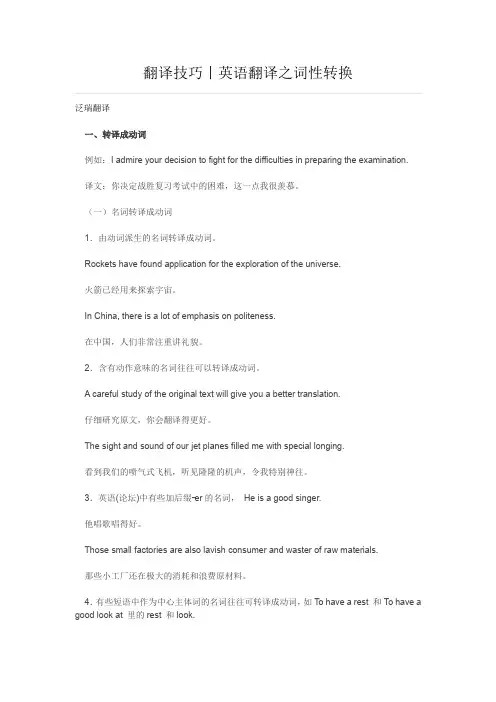
翻译技巧丨英语翻译之词性转换泛瑞翻译一、转译成动词例如:I admire your decision to fight for the difficulties in preparing the examination.译文:你决定战胜复习考试中的困难,这一点我很羡慕。
(一)名词转译成动词1.由动词派生的名词转译成动词。
Rockets have found application for the exploration of the universe.火箭已经用来探索宇宙。
In China, there is a lot of emphasis on politeness.在中国,人们非常注重讲礼貌。
2.含有动作意味的名词往往可以转译成动词。
A careful study of the original text will give you a better translation.仔细研究原文,你会翻译得更好。
The sight and sound of our jet planes filled me with special longing.看到我们的喷气式飞机,听见隆隆的机声,令我特别神往。
3.英语(论坛)中有些加后缀-er的名词,He is a good singer.他唱歌唱得好。
Those small factories are also lavish consumer and waster of raw materials.那些小工厂还在极大的消耗和浪费原材料。
4.有些短语中作为中心主体词的名词往往可转译成动词,如To have a rest 和To have a good look at 里的rest 和look.You must be tired. Why don’t you take a rest?你一定很累了,为什么不休息一会呢?The car braked sharply, coming to rest on the edge of the cliff.汽车猛的刹住,停在悬崖边上。
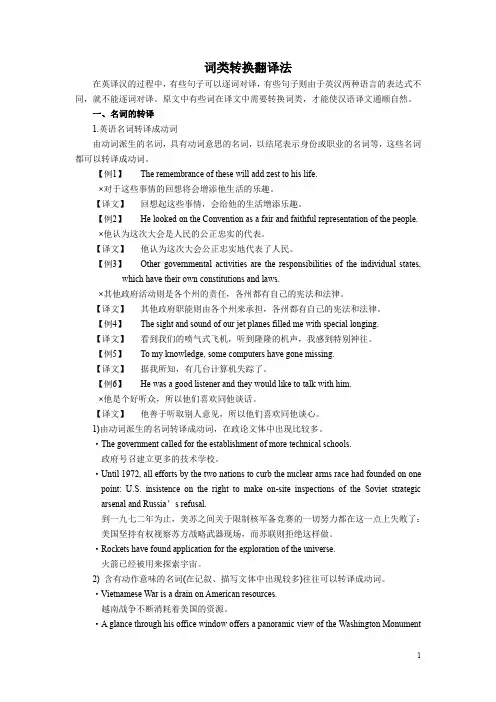
词类转换翻译法在英译汉的过程中,有些句子可以逐词对译,有些句子则由于英汉两种语言的表达式不同,就不能逐词对译。
原文中有些词在译文中需要转换词类,才能使汉语译文通顺自然。
一、名词的转译1.英语名词转译成动词由动词派生的名词,具有动词意思的名词,以结尾表示身份或职业的名词等,这些名词都可以转译成动词。
【例1】The remembrance of these will add zest to his life.×对于这些事情的回想将会增添他生活的乐趣。
【译文】回想起这些事情,会给他的生活增添乐趣。
【例2】He looked on the Convention as a fair and faithful representation of the people.×他认为这次大会是人民的公正忠实的代表。
【译文】他认为这次大会公正忠实地代表了人民。
【例3】Other governmental activities are the responsibilities of the individual states, which have their own constitutions and laws.×其他政府活动则是各个州的责任,各州都有自己的宪法和法律。
【译文】其他政府职能则由各个州来承担,各州都有自己的宪法和法律。
【例4】The sight and sound of our jet planes filled me with special longing.【译文】看到我们的喷气式飞机,听到隆隆的机声,我感到特别神往。
【例5】To my knowledge, some computers have gone missing.【译文】据我所知,有几台计算机失踪了。
【例6】He was a good listener and they would like to talk with him.×他是个好听众,所以他们喜欢同他谈话。


翻译词性转换Translation: Converting Parts of Speech (700 words)在语法学中,词性是表达词语在句子中所起作用的一种方式。
每个词都有其特定的词性,包括名词、动词、形容词、副词、代词、冠词、介词、连词和感叹词。
有时候,在句子中更改词性可以增强语言的表达效果,使句子更具丰富性和清晰度。
下面是一些常见的词性转换示例:1. 名词转动词:- knowledge (名词) -> acknowledge (动词) 例句:He acknowledged his lack of knowledge on the subject.- success (名词) -> succeed (动词) 例句:She succeeded in achieving her goals.2. 形容词转动词:- happy (形容词) -> make happy (动词) 例句:The surprise gift made her happy.- uncomfortable (形容词) -> make uncomfortable (动词) 例句:The tight shoes made him uncomfortable.3. 动词转名词:- run (动词) -> runner (名词) 例句:He is a fast runner.- speak (动词) -> speaker (名词) 例句:She is an excellent speaker.4. 副词转形容词:- quickly (副词) -> quick (形容词) 例句:They were quick torespond.- happily (副词) -> happy (形容词) 例句:The children looked happy playing in the park.5. 名词转形容词:- beauty (名词) -> beautiful (形容词) 例句:She is a beautiful girl.- darkness (名词) -> dark (形容词) 例句:The room was dark.6. 形容词转副词:- careful (形容词) -> carefully (副词) 例句:He drove carefully to avoid accidents.- quick (形容词) -> quickly (副词) 例句:She finished her homework quickly.7. 动词转副词:- talk (动词) -> talkatively (副词) 例句:She spoke talkatively during the meeting.- walk (动词) -> walk briskly (副词) 例句:He walked briskly to catch the bus.8. 形容词转名词:- old (形容词) -> old age (名词) 例句:He enjoys reading about old age.- poor (形容词) -> poverty (名词) 例句:The charity aims to alleviate poverty.9. 动词转形容词:- perform (动词) -> performing (形容词) 例句:The performing arts are popular among students.- create (动词) -> creative (形容词) 例句:She has a creative mind.10. 代词转名词:- he (代词) -> hero (名词) 例句:He is a hero in their eyes.- they (代词) -> team (名词) 例句:They are a strong team.通过对词性的转换,我们可以在句子中更有创意地表达自己的意思,使句子更强大和更有个性。
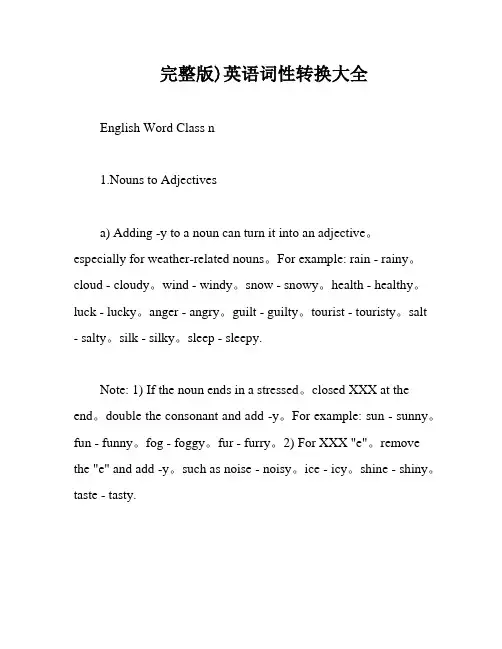
完整版)英语词性转换大全English Word Class n1.Nouns to Adjectivesa) Adding -y to a noun can turn it into an adjective。
especially for weather-related nouns。
For example: rain - rainy。
cloud - cloudy。
wind - windy。
snow - snowy。
health - healthy。
luck - lucky。
anger - angry。
guilt - guilty。
tourist - touristy。
salt - salty。
silk - silky。
sleep - sleepy.Note: 1) If the noun ends in a stressed。
closed XXX at the end。
double the consonant and add -y。
For example: sun - sunny。
fun - funny。
fog - foggy。
fur - furry。
2) For XXX "e"。
remove the "e" and add -y。
such as noise - noisy。
ice - icy。
shine - shiny。
taste - tasty.b) Adding -ed to a noun can turn it into an adjective。
ForXXX "e"。
simply add -d。
such as spot - spotted。
talent - talented。
organize - organized。
balance - balanced.c) Adding -ful to some abstract nouns can turn them into adjectives。
英语词性转换归纳汇总英语词性转换归纳汇总1动词变名词1.v+ ment 结尾achieve —— achievement 成就advertise —— advertisement 广告agree —— agreement 同意amuse——amusement 娱乐commit —— commitment 承诺,奉献develop —— development 发展disagree —— disagreement 不赞同equip 装备—— equipment 装备,器材govern 统治—— government 政府manage——management 经营,管理argue —— argument 争吵2.V+ ion 结尾attract —— attraction 吸引discuss —— discussion 讨论express ——-expression 词语;表达instruct —— instruction 用法说明invent—— invention 发明predict ——prediction 预言impress —— impression 印象suggest ——suggestion 建议,暗示educate —— education 教育graduate —— graduation 毕业operate —— operation 操作,动手术illustrate —— illustration 阐明,举例说明pollute ——pollution 污染introduce ——introduction 介绍organize ——organization组织imagine ——imagination 想象力inspire——inspiration 灵感,鼓舞人心的事invite —— invitation 邀请compete ——competition 竞争,比赛pronounce ——pronunciation发音admit —— admission 承认permit —— permission 允许conclude —— conclusion 结论decide —— decision 决定describe —— description描写,描绘resolve —— resolution 决心solve ——solution 解决方法3.V+ ance 结尾allow —— allowance 允许appear ——appearance 外貌,出现perform ——performance 演出exist —— existence 存在4.V+ ing 结尾end —— ending 结尾,结局train ——training训练mean —— meaning 意义say—— saying 谚语remind —— reminding提醒bathe ——bathing沐浴5.词尾加-er或-or后变成表示“某一类人”的名词work——worker 工人teach——teacher老师sing——singer 歌手jump——jumper跳高运动员play——player表演者、运动员learn——learner 学习者visit——visitor访问者invent——inventor发明家6.V+ 其他beg——beggar 乞丐sit——seat 座位believe —— belief 信仰behave —— behavior 行为know—— knowledge 知识fly—— flight 飞行mix —— mixture 混合物press —— pressure 压力serve —— service 服务succeed ——success 成功pursue —— pursuit 追求,从事propose —— proposal 建议withdraw ——withdrawal 取钱;收回;撤退survive ——survival--survivor 幸存者arrive —— arrival到达analyze —— analysis 分析形容词变名词1.词尾ent改为ency或enceefficient有效率的——efficiency 效率patient——patience/impatience 耐性/无耐心dependent——dependence依赖性independent——independence 独立性urgent——urgency 紧急2.ble结尾,ble改为bility possible——possibility 可能responsible——responsibility 责任;职责3.其他accurate——accuracy 准确性prosperous——prosperity 繁荣true——truth 真相wide——width 宽度long——length 长度high——height 高度名词/动词变形容词1.名词+yguilt 罪恶——guilty 内疚的health——healthy 健康的luck——lucky 幸运的cloud——cloudy 多云的wind—windy 多风的rain——rainy 多雨的snow——snowy 多雪的tourist —— touristy 游客多的er结尾,改er为ry hunger——hungry 饥饿的anger —— angry 生气的fog—— foggy 有雾的sun—— sunny 阳关灿烂的fur—— furry 毛皮的shine——shiny 发亮的taste —— tasty 美味的2. 名词/动词+ ed以辅音+辅音结尾的单词,直接加edtalent —— talented 有天赋的offend ——offended 生气的crowd ——crowded 拥挤的以元音字母e结尾的单词直接加dbalance —— balanced 平衡的organize——organized 有组织的pollute ——polluted 被污染的please ——pleased 高兴的元音加辅音结尾的单词,词尾辅音双写再加ed spot ——spotted 有斑点的3.名词+ ful/lesscare —— careful/ careless 小心的/ 粗心的help—— helpful / helpless 有帮助的/ 无助的use—— useful/ useless有用的 / 无用的meaning ——meaningful / meaningless有意义的/无意义的colour—— colourful /colourless多彩的/无色的pain 疼痛——painful /painless痛苦的/ 不痛的thank——thankful / thankless 充满感激的/ 不知感恩的peace 和平——peaceful 和平的play游戏—— playful 爱玩耍的home —— homeless 无家可归的4.名词/动词+ ablechange —— changeable 易变的adjust——adjustable 可调整的comfort——comfortable 舒适的knowledge——knowledgeable 知识渊博的suit ——suitable 合适的动词以辅音加y结尾把y变i 加able ,deny—— deniable 可否认的rely—— reliable 可靠的5.名词+ ouscourage——courageous 勇敢的danger—— dangerous 危险的以y结尾,改y为i再加ousmystery 神秘—— mysterious 神秘的6.ce 变 tconfidence——confident 自信的difference——different 不同的dependence —— dependent 依赖他人的independence——independent 独立的7.词尾加 aladdition—— additional 附加的,额外的music—— musical 音乐的person——personal (私人的) nation——national 国家的education——educational有教育意义的tradition——traditional 传统的origin起源——original 新颖的;独创的以元音字母e 结尾的单词,去掉词尾元音加al nature——natural 自然的globe—— global 全球的特例:class——classical 经典的medicine 药——medical 医学的grammar—— grammatical 语法的8.名词+ lyfriend——friendly 友好的live——lively 活跃的,有生气的love——lovely 可爱的week——weekly 每周的man——manly 男子气概的;强壮的9.词尾+ enwood—— wooden 木制的wool—— woolen 羊毛的10. 表示方位的词East——eastern West——western South——southern North——northernAsia 亚洲—— AsianAfrica 非洲——AfricanEurope欧洲—— EuropeanAmerica 美洲——American12. 其他energy精力——energetic 精力充沛的strategy——strategic 战略的scientist——scientific 科学的fool 傻子——foolish 愚蠢的love——loving 慈爱的pleasure——pleasant令人愉快的/ pleased高兴的pride——proud 自豪的4形容词变动词1.词尾加izemodern——modernize 使...现代化social——socialize 使...社会化fast——fasten 使固定;集中于short—— shorten 缩短wide——widen 放宽less——lessen 使...减少特例(有变形):long——lengthen 使延长strong ——strengthen 加强;巩固3.词前加enlarge —— enlarge 扩大;放大5形容词变副词1.形容词+ lybad——badly 坏地bright——brightly 明亮地casual——casually 随意地clear——clearly 清楚地complete——completely 完全correct——correctly 正确地final——finally 最后fortunate——fortunately幸运地general——generally 一般来讲loud——loudly 大声地particular ——particularly特别地polite——politely 礼貌地proper ——properly适当地main——mainly 主要地most ——mostly 多半,大多数normal——normally 正常地quick——quickly 迅速地quiet——quietly 轻轻地,安静地real——really 真正地recent ——recently 最近;近来sad——sadly 悲哀地slow——slowly 缓慢地special——specially 专门,特殊地specific——specifically 特定地,明确地strong——strongly 坚决地,强烈地sudden——suddenly突然usual——usually 通常2. 以le 结尾的,去e + ycomfortable——comfortably 舒服地gentle——gently 温柔地possible——possibly 可能地simple——simply 仅仅;只;简单地terrible——terribly 非常;极度地3. 辅音字母+ y 变y为 ilyeasy——easily 容易地heavy——heavily 沉重地happy——happily 快乐地4.特殊good——well好地true——truly 真实地通过这样的学习,大脑将这些同根词的不同形式联系起来,可以大大提高学习效率。
词性转换翻译词性转换是英语语法中的一个重要概念,它指的是将一个单词从一种词性转变为另一种词性。
通常,词性转换是通过添加前缀、后缀、改变词形或使用不同的词根来完成的。
下面是一些常见的词性转换及其翻译例子。
1. 名词转动词名词可以通过加上动词缀-ize或-ify转化为动词。
例如:- Noun (名词): hospital (医院)- Verb (动词): hospitalize (住院)2. 形容词转动词形容词可以通过加上动词缀-en或-ify转化为动词。
例如:- Adjective (形容词): soft (柔软的)- Verb (动词): soften (变软)3. 动词转名词动词可以通过添加名词后缀-er或-or转化为名词。
例如:- Verb (动词): sing (唱歌)- Noun (名词): singer (歌手)4. 形容词转名词形容词可以通过添加名词后缀-ness或-ity转化为名词。
例如:- Adjective (形容词): happy (快乐的)- Noun (名词): happiness (快乐)5. 名词转形容词名词可以通过添加形容词后缀-al或-ous转化为形容词。
例如:- Noun (名词): music (音乐)- Adjective (形容词): musical (音乐的)6. 动词转形容词动词可以通过添加形容词后缀-ing或-ed转化为形容词。
例如:- Verb (动词): interest (感兴趣)- Adjective (形容词): interesting (有趣)7. 名词转副词名词可以通过添加副词后缀-ly转化为副词。
例如:- Noun (名词): quick (快)- Adverb (副词): quickly (快速地)8. 形容词转副词形容词可以通过添加副词后缀-ly转化为副词。
例如:- Adjective (形容词): careful (小心的)- Adverb (副词): carefully (小心地)词性转换在英语中非常常见,掌握这些转换规则可以帮助我们更好地理解和表达英语。